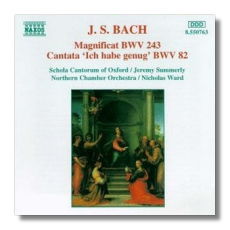
The Internet's Premier Classical Music Source
Related Links
- J.S. Bach Reviews
- Latest Reviews
- More Reviews
-
By Composer
-
Collections
DVD & Blu-ray
Books
Concert Reviews
Articles/Interviews
Software
Audio
Search Amazon
Recommended Links
Site News
 CD Review
CD Review
Johann Sebastian Bach

Magnificat & Cantata #82
- Magnificat
- Cantata #82, 'Ich habe genug'
Anna Crookes & Jayne Whitaker, sopranos
Caroline Trevor, alto
Timothy Robinson, tenor
Nicholas Gedge, bass
Christine Swain, oboe
Oxford Schola Cantorum & Northern Chamber Orchestra/Nicholas Ward
Naxos 8.550763 53min
I was very critical of Maestro Ward's bland Haydn Symphony disc on Naxos some months back. Thus my surprise upon learning that he's an exceptionally gifted and sensitive Bach interpreter. Here he leads a jubilant Magnificat that is notable for its rhythmic vitality and vibrant colors. Ward's tempos are moderate, but never sluggish. His unhurried pacing allows the music to bloom gloriously, especially in the festive opening movement. Ward is also very exciting in the score's most dramatic moments, such as the chorus 'Omnes generationes'. The Northern Chamber Orchestra performs on modern instruments, and the effect is simply stunning. The trumpets in particular have a brilliance that their inferior 'authentic' cousins simply cannot match.
The chorus is small but fortunately *not* limited to the five soloists as in Andrew Parrott's breathless EMI recording. And their youthful freshness and vitality are most welcome in this work. Ward's soloists are variable, but never less than adequate. Jayne Whitaker has a small, girlish voice, but her simple, direct way with the 'Et exsultavit' is very appealing in its own, understated way. Anna Crookes has a far more plush instrument, and she delivers the 'Quia respexit' in passionate and almost operatic manner. Oboe soloist Christine Swain (heard again in the Cantata) produces a plush, organ-like tone. Nicholas Gedge's good humor and jaunty approach to 'Quia fecit mihi magna' reminds me strongly of the great Walter Berry. (Alas, he's not nearly as persuasive in 'Ich habe genug'.) Timothy Robinson blends beautifully with the alto in their duet ('Et misericordia'), but his relentlessly staccato treatment of 'Deposuit potentes' soon becomes tiresome. Fortunately, his aria is one of the shortest in the score. With lovely solo woodwinds and crisp pizzicato string accompaniment, Ward establishes a perfectly charming atmosphere for Caroline Trevor's appearance in 'Esurientes implevit'. Her interpretation of the text, however, is far too businesslike, and she appears to be completely uninterested in what she is singing. These quibbles aside, this Magnificat is a moving and deeply spiritual experience, which surely must be closer to the composer's original intentions than the sterile products of Parrott, Harnoncourt, and their unfortunate ilk.
Gedge seems far less comfortable in the Cantata. His phrasing in the first aria is so disjointed that one wonders at times if he's sight-reading the music. He even appears to be on the verge of running out of breath from time to time. His voice has a very light timbre, and it simply does not have the necessary resonance or body that is so vital in this dark, mysterious score. His vibrato has an annoying tendency to become a wobble, and he brings little variety or expression to his lines. On the other hand, Gedge's soft-spoken, tender way with his second aria ('Schlummert ein') is, by contrast, quite magical, but he once again seems out of his depth in the more emotionally demanding final aria ('Ich freue mich'). Ward's accompaniment is serene, delicate, and splendidly played. Oboist Swain is consistently more expressive and convincing than Gedge.
The Naxos recording is excellent. The balance between the soloists, choir, and orchestra in the Magnificat is well-nigh perfect, and the bass is rock solid. Instrumental details are crystal clear, yet the sound is warm, natural, and open. However, the skimpy playing time is unusual for Naxos. There was plenty of room for another Cantata, which might have given us the welcome opportunity to hear more of the remarkable Ms Crookes. The informative notes include all texts and translations - bless you for that, Naxos!
Copyright © 1997, Tom Godell


















